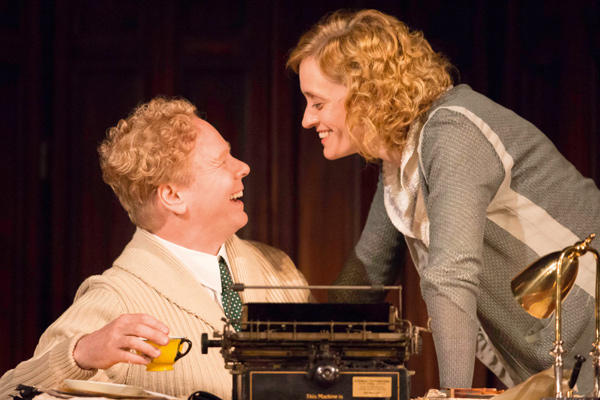First the good news. Strange Interlude by Eugene O’Neill has been cut down from five hours to just under three and a half. The action, if you can call it that, begins at 7 p.m. but if you reach the Lyttelton theatre at the more civilised hour of 8 you’ll have missed very little. The first act could be disposed of in six words, ‘my fiancé died in the war’, but O’Neill is such a colossal twaddler that he wastes absolutely ages gabbling on about this and that before plunging into his story.
The main character, Nina, is a bourgeois flapper who approaches life in a spirit of cynical pragmatism. In the middle of Act II (at roughly 8.10 p.m., in real time), she marries an impotent jerk whose bloodline turns out to be infested with lunacy. Fearful of giving birth to a coop of halfwits, Nina seduces a dashing hunk and passes off the resulting pregnancy as the jerk’s. She is then torn between the jerk and the hunk but her craving for stability compels her to plump for the jerk. He sinks a fortune into a dud advertising agency that turns into a gold mine. They become millionaires. In the 1920s, Nina would have been frowned upon as ‘an adventuress’ and O’Neill was keen to excite the audience’s sense of moral disapproval.
Today we regard Nina as a plucky, independent go-getter and the play has lost its ability to shock or scandalise. There’s another snag, too. O’Neill’s experimental use of soliloquies lumbers the show with confusion and sluggishness. The characters keep turning towards the audience to deliver knowing asides, which aren’t intended to be heard by the other characters. O’Neill was so pleased with this sloppy contrivance that he feared it would be instantly and widely copied. It wasn’t. Were he alive today, his agent would order him to remove all these pointless add-ons. Alas, he’s dead, so his blunders are now part of his glorious legacy.
Is this play any good? In a word, yes. Despite the wordiness, the time-wasting, the monstrous plotlines, and the barmy experimentation, the show steals up on you and takes you by surprise. During the final hour I was so immersed in the characters’ lives that I was gripped by their every move. Anne-Marie Duff trills professionally through the numerous oscillations of Nina’s emotional life. She’s well supported by Jason Watkins as her dependable twerp of a husband. Watkins has just the right manner, a lovable oafishness, and just the right physique, a stunted rotundity, to play the nerdy outsider who accidentally scoops a fortune. And his voice is a wonderfully insistent and needling instrument. Charles Edwards turns in an unobtrusively sensational performance as a prissy old bachelor besotted with Nina. Edwards is far too handsome to be a clown and yet he has a power to compel laughter that defies analysis. ‘Nina, you’ve been reading books,’ he says at one point. Is that funny? Not remotely. Wonder of wonders, he turned it into a belter.
The Young Vic has welcomed Belarus Free Theatre and its touring show Trash Cuisine, which purports to examine capital punishment. Flashy, digressive and overly impressed with itself, the play roams the globe looking for injustices to ponder. Can the deaths of a million Rwandans and the wrongful conviction of a single Ulsterman be morally equivalent? Yup, according to this show. It’s all the same. Waterboarding, falsification of evidence, wrongful arrest, the electric chair, Christopher Hitchens, genocide, forcing a prisoner to stand against a wall for three hours. Any bit of judicial nastiness is thrown into the mix.
And the show uses the most inappropriate methods to dramatise its content. There are drum solos and bad-taste stand-up routines. There are synchronised dances that tell us all we will ever need to know about synchronised dances. Sixty seconds of vile screaming is followed by another 60 seconds of vile screaming. Vast quantities of meat, lentils, flour and vegetables — enough to feed the entire audience — are flung about the theatre and wasted. On video, there’s a description of a state killing in America delivered by the death-row lawyer Clive Stafford-Smith, that should rank alongside Orwell’s ‘Shooting an Elephant’ as a piece of campaigning journalism. Rather than letting the words speak for themselves, the actors use them to satirise yuppie idiots idling in luxury restaurants. As with everything here, the show trivialises the subject matter and destroys the campaign it seeks to advance.
At the end, a begging bucket was rattled at us and I was so incensed by this fatuous and depressing embarrassment of a play that I declined to contribute. Amazing. A show about the horrors of state murder turned a lifelong opponent of capital punishment into a ‘Couldn’t Give A Toss.’







Comments